
Motivation in Football Manager
An interesting subject in Football Manager, that can really negatively and positively affect performances is motivation and people management. You have to be able to read the personalities in your squad and figure out ways to get the best performances out of your players, beyond tactical familiarity and training methods. The ways you talk to your players are vitally important.
Assessing the personalities in your squad
Right off the bat, every team will be a different soup of personalities and skill sets. Your players will be motivated differently depending on the situation, their age, current form, physical condition, environmental conditions like facilities, staff and teammates. Especially if your team is largely made up of youth prospects, you will have to handle those personalities with care. You can be harsher with someone with more experience than someone who is more immature. Players who have a breadth of experience and skills can sometimes become complacent moreso than a young player trying to prove himself. Those players need re-focusing and criticising more than anything else. Young players, oppositely, need motivating and gentle criticism so that they perform consistently. Inconsistency is the struggle for youth prospects.
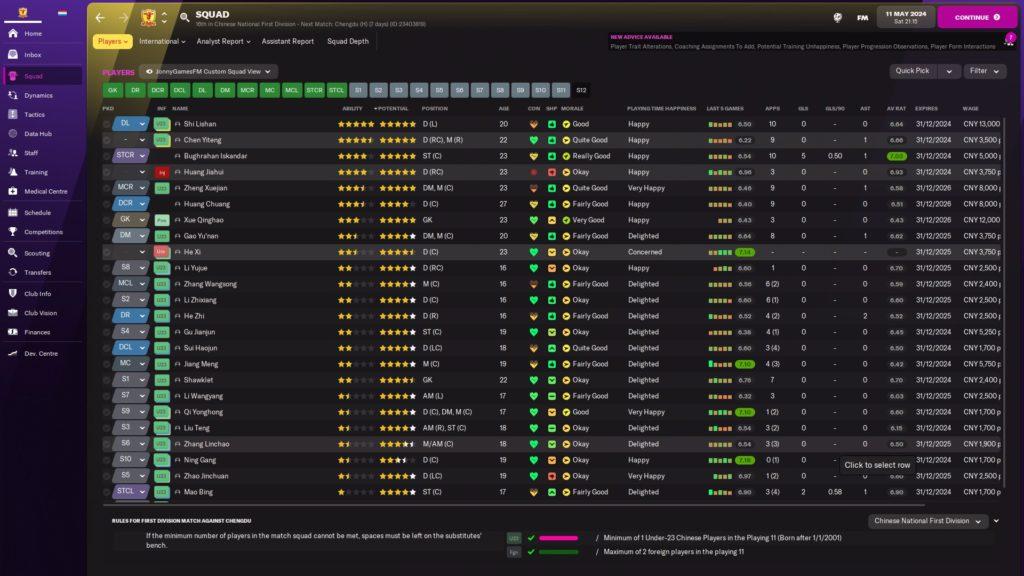
Shouts
Shouts during the game are always fun, but can sometimes backfire. The temperament of your players in certain situations is very fluid. Depending on the time of the game, what has occurred during the game, their mood before the game and their individual personalities all play a role in their motivation.
Some suggestions that have worked well for me; Praising the players when they are doing what you ask them to successfully, and right after scoring goals often boosts morale. I do this whenever I can to make them happy on the pitch. However, praising when they are clearly performing below standard can negatively impact their mood. Encouraging them also when you see they are making the right moves tactically and performing as you ask them is useful as well. Especially when the team has been combating low morale after a poor run of form. Demanding more can quickly snap your team out of a poor spell and get them pushing back the other way. Demanding more in the wrong situation can also be negative if the players believe they are already playing well, so be a little cautious with this.
Then we’ve got a few more shouts I consider to be potential remedies to certain situations. Calm Down, Focus, Fire Up, No Pressure and Berate. All of these have positive and negative effects. I’ve found to use these shouts less than, Praise, Encourage and Demand More. However, they can still be affective. Calm down will settle a team on the brink of red cards, Focus will snap the team out of complacency. Fire Up will motivate them to push hard for a brief period. No Pressure eases concern with players on the pitch, and Berate probably will work with top World Class players who are playing poorly and with complacence to show what they are truly capable of. I have rarely used that shout however.
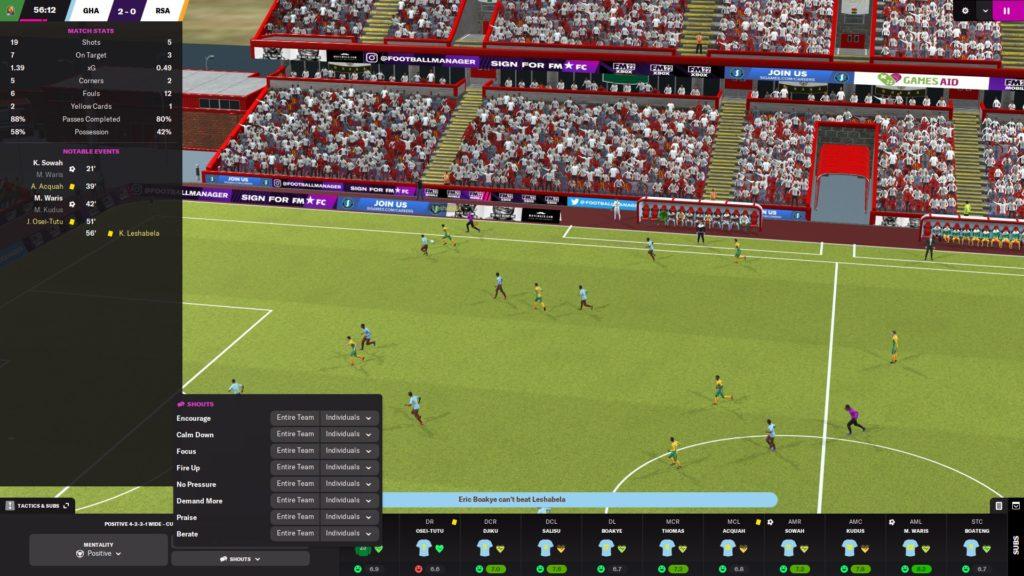
Team Talks
Team Talks can be hit or miss for motivation depending on your manager’s reputation and depending on the players you have at your disposal (world class vs local level etc.). They may or may not respond as you expect them to during your team talks. I just try to approach it as I would any situation speaking to a group.
You need to praise them when they are doing well, criticize them when they are playing poorly and taking into account the level of maturity of your squad. Heavily criticizing youngsters can make them lose confidence. You don’t want to do that. Be critical but encouraging in those situations. Make sure you are reading the game accurately based on the statistics as well. You don’t want to handle the team talk from a position that your squad does not agree with based on the results of the game.
Be persistent in team talks, eventually, if your team is not responding to you, they will over a number of games. Call it like you see it, exihibit strong leadership skills, and then your players will follow suit.
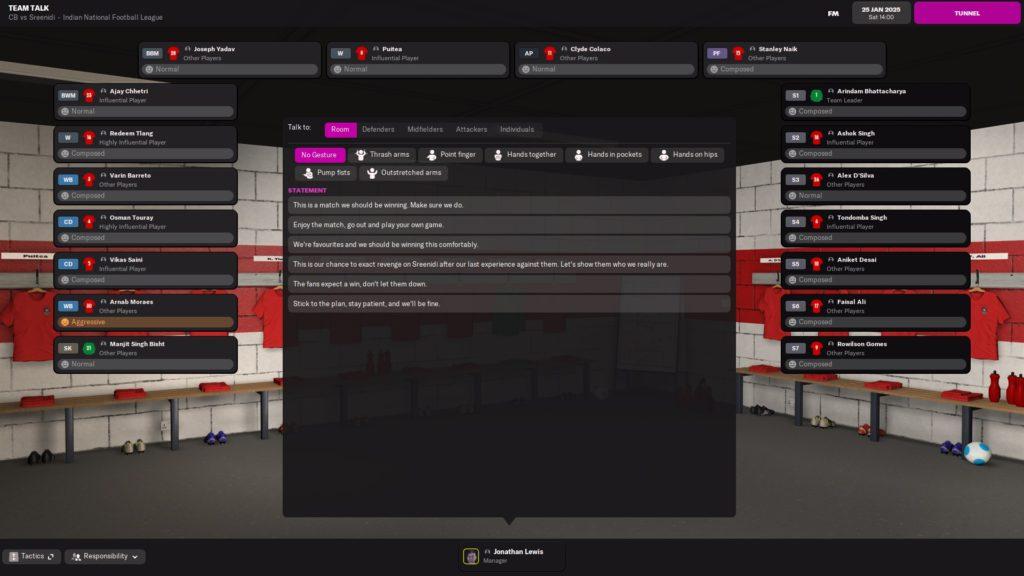
One on One Meetings
One on ones often come from your staff meetings or weekly training performance. Maybe your player will come to you with a concern, transfer request, a playing time request. This is a good opportunity to focus on their motivation. Your job is to get the best out of your players, sometimes it requires a heart to heart to get to the bottom of their concerns, and stoke their motivation to perform. I try not to ignore players when they come to me or someone else makes it know that I should speak to them. I always tackle it head on. However, things can be said of the benefits of occasionally delegating a one on one talk to the Team Captain.
Similar principles as stated above can work in these situations as well. This is a good opportunity to make a positive impression. Maybe the player is under performing, maybe he’s training poorly. You want to motivate them to perform better for you. Try not to let them walk away with a bad impression, that is if you want to keep the player in your plans.
Be truthful about what you expect from them, what your plans are for them. If they don’t agree with your plans and go completely against you, maybe the best course of action is to part ways with them. Take note of their influence in the squad dynamics. If they have little influence they shouldn’t cause any other problems in the squad. But if they are a leader, then you would be wise to get them out of the club as soon as possible if they start a rift with you.
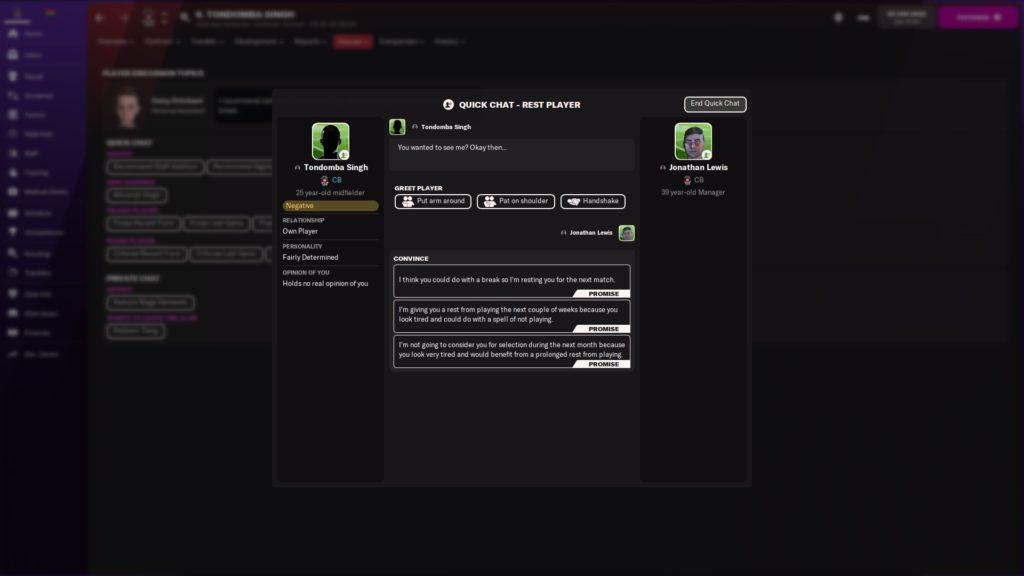
Team Meetings
Team Meetings are usually saved for special occasions or dire circumstances. It’s a chance to motivate a tired and depleted squad on the brink of collapse, or spark that last 1% of drive to win that all important final. These moments are few and far between, but sometimes necessary. Again, you have to be honest with your players. Do not sugar-coat things or be overly-critical of them. Your players will see right through you. If they’ve been struggling but you know they are capable of playing better, tell them that. If you feel they are being complacent and they need a more killer instinct, tell them that. Honesty is imperative in management and it will help in getting the best out of your players.
There isn’t really a template of what will and will not work in Team Meetings, you just have to use your intincts to guide you. I just try to tell the truth, without fear of upsetting people, because sometimes the truth hurts. People need to hear the truth even if it upsets them, then you start to get to the core of the issues you are trying to solve with motivation.
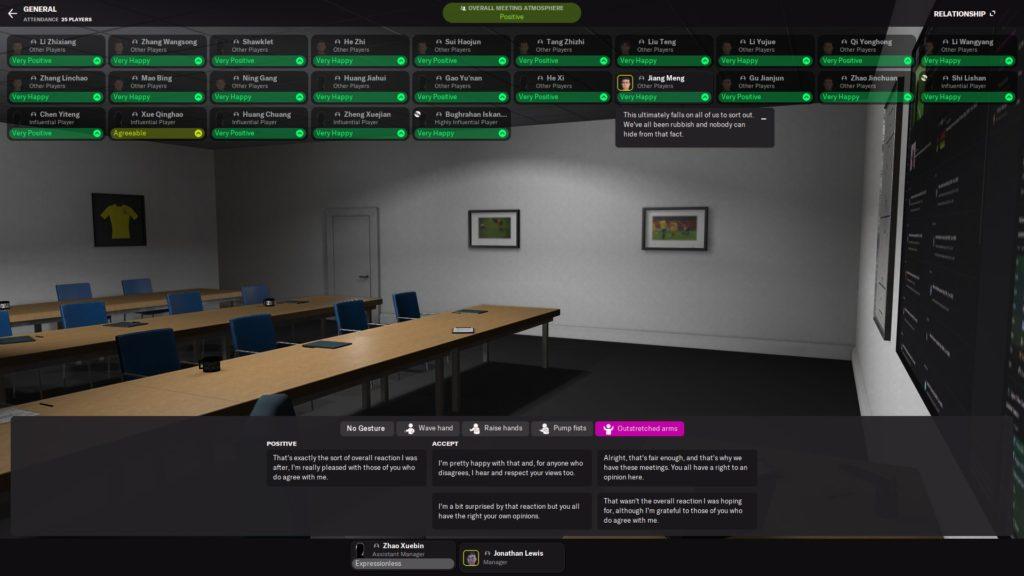
- One-Club Man: La Cantera
- One-Club Man: Defence-First Football & Club DNA In FM24
- One-Club Man: 1st Day on The Job, Meet The Team
- The Story of One-Club Man
- FM24 Release Date Announced!
One thought on “Motivation in Football Manager”